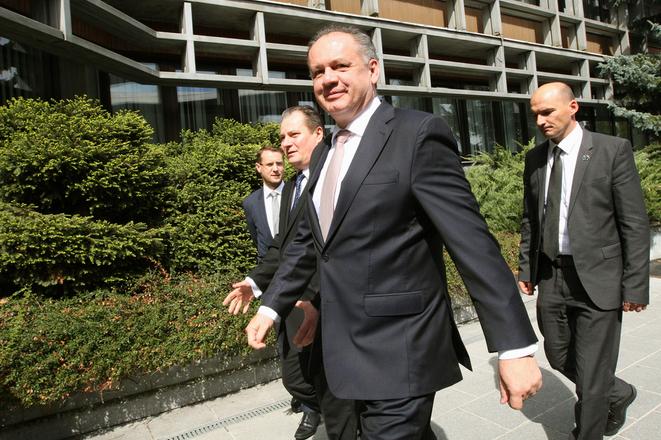“I will not found a political party. I will not run for parliament. And, obviously, I am not thinking of the prime-ministerial post,” President Andrej Kiska said in a video published on Facebook on April 12.
Kiska’s announcement came only one day after he and his wife made a public announcement that they are expecting a third child together (Kiska already has two adult children from a previous marriage, and two children with his current wife Martina).
He has yet to decide whether he will run for re-election in 2019, as an independent and non-partisan candidate. He promised to announce his decision in September 2018 at the latest.
“It would be highly non-standard if he, as a relatively favourite politician, did not try another term in the presidential post, if he decides to stay in politics at all,” political analyst Pavol Baboš from the school of political science at Comenius University in Bratislava told The Slovak Spectator.

Kiska for president again?
If Kiska runs in the presidential race in 2019, he is sure to be a clear favourite of the election, says Peter Spáč of the school of political science at Masaryk University in Brno. In that case, Smer will very likely lead a strong negative campaign against him, as it did in his first election in which he defeated PM Fico in the second, run-off round. But at the moment it is questionable how Smer will approach the election, because “Robert Fico would probably not risk a repeated loss with the same rival”.
“President Kiska’s refusal to enter the party politics in Slovakia (at the moment) may come as good news for individual opposition subjects that do not need to worry about any shifts of voters to their disadvantage,” Spáč told The Slovak Spectator.
New movements among the opposition
With his video announcement, Kiska reacted to the rumours that have become more intensive over the past weeks, and that linked his future in politics mostly with the Progressive Slovakia association around businessman Ivan Štefunko that is expected to be transformed into a political party, with a centre-left programme.
Kiska was rumoured to be getting ready to become its leader once it is transformed into a political party.
Progressive Slovakia in reaction stated that his decision will not influence their activities whatsoever.
“Even though Progressive Slovakia stands by many of the values that President Kiska represents, its emergence and its future is in no way connected with the president’s political activities,” the association wrote in the statement and added that their organisation is based on a wide group of people “who want to move Slovakia forward”.
Kiska would have been a very welcome member for Progressive Slovakia, because this subject needs to overcome a certain intellectual feel that it has created so far, according to Spáč, and the president with wide support among voters would be an ideal candidate to do so.
With Kiska’s no to party politics, Spáč believes “Progressive Slovakia has no reason to maintain the “group” presentation of its representatives any longer, and it can directly name its leader”.
One week after Kiska’s announcement, independent MPs Miroslav Beblavý (formerly the number two politician of the now obsolete Sieť) and Jozef Mihál (who recently left the SaS) announced they were founding a new political party together with their fellow independent parliamentary deputies.

The party should emerge within one year and it is clear that Beblavý and Mihál are to be its leading faces.
Among the reasons they listed for their decision, they said they no longer wanted to wait “until people from the Progressive Slovakia initiative get moving”.
Beblavý claims that they made the final decision two weeks ago, that is before Kiska officially announced he was not planning to join the opposition ranks.
Troubled relations in the highest places
In the past weeks, politicians of the ruling Smer and the Slovak National Party (SNS) have built up tension between themselves and Kiska.
When the disagreements, particularly about foreign policy, grew, Fico blamed it on the president’s advisers.
“I understand that his advisers are pushing him into conflict, because Mr President is preparing some political background for the future,” the prime minister said in March 2017 on the TA3 news channel, and reiterated that he was not going to get dragged into the conflict.
In the most recent development, Smer’s Fico and Interior Minister Robert Kaliňák, as well as SNS leader and Parliament’s Speaker Andrej Danko repeatedly attacked Kiska for using a governmental plane for frequent flights to his hometown, Poprad.
Will Kiska’s decision not to run as competition to Fico and Danko in the next parliamentary election change anything about it – will they target him less?
“It is possible that the intensity of the attacks of ruling politicians against Kiska will decrease, but the president has already shown that he has got the sense for opening topics that are not to the government’s liking and are a burden for them,” Spáč said, citing the president’s support for the recent anti-corruption march organised by students in Bratislava on April 18 as an example.
Baboš opined that the attacks on Kiska could calm down if they were only meant to lower his popularity among the electorate were he to join a political party as competition to Fico and Danko.
“But if the aim was rather to divert attention away from their own problems, and the public pressure on placing responsibility on Minister Kaliňák, then the sharp stances towards the president might not disappear completely,” Baboš said.
Radka Minarechová contributed to this report



 Andrej Kiska does not want to walk down the path of party politics. (source: Sme - J. Kroslak)
Andrej Kiska does not want to walk down the path of party politics. (source: Sme - J. Kroslak)